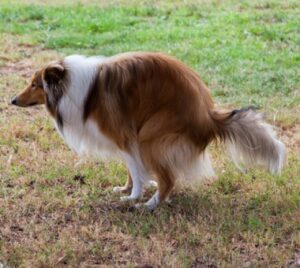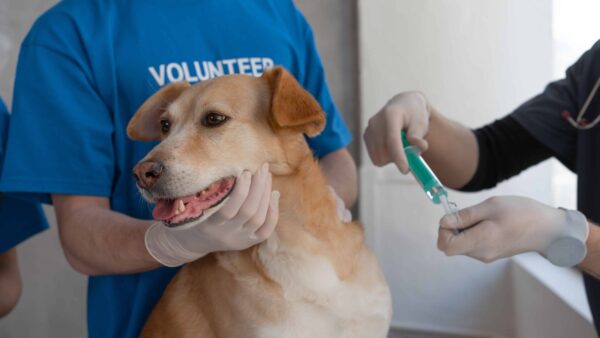Many pet owners often express concern when their dogs experience diarrhea, frequent bowel movements, or loose stools, forgetting that the opposite end of the spectrum which is constipation is another significant issue to look out for.
Constipation which is characterized by hard straining during bowel movements and infrequent or difficult stools is a very common health issue that can be very uncomfortable for dogs.
Constipation is caused by a variety of reasons including lack of digestive fiber in the diet, lack of exercise, or dehydration. Fortunately for you and your dog, constipation in dogs is often mild and can be easily treated at home.
In this article, we have explained the causes, symptoms, and most importantly how to treat your dog’s constipation at home.
Before delving into this article, it is worth noting that:
It is important to consult with a veterinarian before administering any home remedies to treat your dog’s constipation. By doing this, your vet will assess the dog and determine if the constipation is mild or severe.
In the case of severe constipation, home remedies may not be effective. However, for mild constipation, the home remedies listed in this blog post are very effective.
Causes and Prevention of Constipation in Dogs

While canine constipation is usually harmless to dogs, it is important to know what causes it and how to prevent it. The causative agent of a dog’s constipation may be harmless, and in some cases, it can be something serious.
Below are the causes of dog’s constipation and how to prevent them:
Dehydration: When all you feed your dog is dry kibbles with no adequate water or moisture, your dog will become dehydrated, making their stool dry, hard, and difficult to pass. To prevent this, you should ensure that your dog has access to clean water at all times. You may also incorporate wet foods into their diet instead of only dry kibbles.
Dietary Problem: An adequate dog’s diet should contain fiber and calcium in moderate amounts. Fiber is essential in a dog’s diet; it maintains the condition of the digestive tract and aids bowel movement. Excess or shortage of fiber can cause constipation in dogs. Aside from fiber, too much calcium from chewed bone and bone meal can also cause constipation in dogs. To prevent this, regulate the amount of fiber and calcium in your dog’s daily diet and ensure that it is not in excess or shortage,
Lack of Exercise: Have you ever noticed how your dog tends to have an extended and satisfying bowel movement following a lengthy walk? Good! That’s the impact of good exercise. Regular exercise aids metabolism and it stimulates the dog’s digestive tract which helps them stay regular. To prevent this, take your dog on long walks regularly and engage them in exercise.
Ingesting Objects or Hairs: Swallowing non-food items like toys, bones, or fabric can block the intestinal tract of dogs. Dogs also self-groom themselves and some of them do this to the point of belly upset. Ingesting excessive hair during self-grooming can lead to constipation, as hair doesn’t pass easily through the digestive system. Bowel obstruction by foreign objects is an emergency issue that should be reported to a vet promptly.
Stress or Anxiety: Digestive issues such as diarrhea, constipation, and stomach upset can be associated with stress in dogs. This is because the dog’s brain and digestive tract are connected in one way or the other and any sign of distress or anxiety can affect your dog’s digestive system, leading to constipation.
Injury: Injury such as arthritis or chronic joint pain, can cause immobility in dogs and they may have trouble squatting when trying to relieve themselves. Injury affecting the abdomen, spine, and pelvis can also disrupt the normal nerve signals that control bowel movements. This disruption can lead to weakened muscle function in the colon and hinder the ability to pass stools effectively, resulting in constipation.
Age: While constipation is common in all dogs, older dogs are more prone to constipation due to reduced mobility and slower metabolism.
Medication Side Effects: Some medications, particularly certain pain relievers or antacids, can contribute to constipation as a side effect. If your dog’s constipation starts after giving it medication, check the medicine pack and confirm if one of its side effects is constipation.
Disease: Underlying health issues such as an enlarged prostate gland, hypothyroidism, inflamed anal sac and tumors in the digestive tract can all result in constipation.
How Do You Know Your Dog is Constipated?

Constipation in dogs can be mild or severe. Whichever one it may be, if your dog is making repeated unsuccessful attempts to have bowel movements throughout the day, it’s a clear indicator of constipation.
Aside from this, there are other signs that indicate mild constipation in dogs. These signs include:
- Decreased appetite
- Straining to poop
- Pooping for a longer time
- Producing hard stools
- Showing signs of discomfort such as vocalizing, panting, or whining while pooping
All the signs above are a clear indicator of mild constipation, and they can all be treated by the home remedies listed in this article. However, for severe constipation, you may have to consult with your vet for treatment.
Below are the signs of severe constipation in dogs:
- Swollen or Distended Abdomen
- Lethargy and Lack of Appetite
- Vomiting
- Blood in stool
- No bowel movements for an extended period exceeding three days.
- Abdominal discomfort
If you notice any of these signs, you need to book an appointment with your vet promptly for proper medication and treatment.
8 Home Remedies for Treating Dog’s Constipation

As stated earlier in this article, it is always best to consult with your veterinarian first for proper assessment. If all severe causes of constipation are ruled out by your vet, you can proceed to treat them with these home remedies.
Below are 8 remedies to treat dog’s constipation at home:
Increase Water Intake
Dehydration is one of the common causes of constipation in dogs. As such, ensure your dog has access to clean water at all times. You should place a water bowl filled with water inside and outside their room.
Instead of a normal water bowl, you may get a water fountain for your dog. Many dogs find this enticing.
If your dog refuses to drink water, consider adding low-sodium chicken broth to the water, this treat will surely lure your pooch to drink the water.
Add Pumpkin Puree to Your Dog’s Meals
Pumpkins have many nutritional values that are beneficial to dogs. It also has a high fiber content, making it a perfect option for treating constipation.
Fiber helps to regulate a dog’s digestive tract, the moisture in pumpkin will also help soften the hard stool present in your dog’s colon making it easier to pass out.
Try Natural Laxatives or Stool Softeners
Natural laxatives can help treat constipation in dogs by softening and loosening the stool. They work by increasing water content in the intestines, making it easier for the dog to pass stools.
Below are some safe options for your dog:
- Pumpkin
- Sweet Potatoes
- Leafy greens such as Spinach and Kale
- Coconut oil
Daily Exercise Routines
Exercise will improve blood flow to the digestive tract and colon, leading to proper digestion and easy passage of waste through the Gastrointestinal tract.
If your dog is constipated, a short but frequent walk might just do the trick for it.
Regular Abdominal Massages
Giving abdominal massages is one of the best ways to stimulate a dog’s digestive system. If your dog has mild constipation, make him lie down with his belly facing up, and massage his belly gently in a circular motion for 5 minutes.
High Fiber Dog Food
High-fiber dog foods such as kale and spinach are very rich in fiber, and they can help regulate your dog’s GI tract.
According to the American Kennel Club, the intestinal bacteria in your dog’s gut convert fiber into fatty acids, aiding in the facilitation of their digestion.
Fiber can be very filling, hence, ensure your dog has access to fresh water while eating them.
Below are some high-fiber dog foods apart from kale and spinach:
- Apple
- Banana
- Blueberries
- Broccoli
- Carrot
- Green beans
- Pumpkin
- Sweet Potato
Canned Food
If your dog’s diet is strictly dry kibble, switch to canned foods in the meantime. Canned foods have natural moisture that can easily hydrate your dog.
To prevent any stomach discomfort for your dog, it’s advisable to introduce the canned food gradually to your dog. You may also have to seek your vet’s advice on the most suitable canned foods for your beloved companion.
Give your Dog Probiotic
Probiotics are beneficial bacteria that can help alleviate constipation in dogs by promoting a healthy balance of gut flora.
These friendly bacteria assist in breaking down food and absorbing nutrients, which can lead to smoother digestion.
Probiotics can also reduce inflammation in the digestive tract and enhance overall bowel regularity, making it easier for dogs to have regular and comfortable bowel movements.
One of the best natural probiotics you can give to your dog is Apple cider vinegar.
When to Seek Veterinary Assistance

While a dog’s constipation is often mild, it can also be severe. In the case of severe constipation, home remedies won’t be enough. If your dog’s constipation persists for more than 48 hours, contact your vet.
Prolonged constipation could be a sign of serious health issues like obstipation, hypothyroidism, enlarged prostate, or any underlying health issue.
In this case, your vet should be contacted. He will be able to give accurate diagnoses and suggest professional treatment and procedures.
Final Thought
Constipation in dogs is a very common issue, and as a responsible dog owner, it is crucial to address and treat this health issue promptly.
While mild constipation can often be effectively managed at home using the remedies we’ve discussed in this blog post, it’s essential to remember that severe or prolonged constipation should be reported to a veterinarian.
Frequently Asked Questions (How to treat dog’s constipation at home)
Can Constipation Be a Sign of a More Serious Health Issue?
Yes, prolonged or severe constipation could be an indicator of a serious health issue. Below are the symptoms of severe constipation:
- No bowel movements for an extended period exceeding three days.
- Swollen or Distended Abdomen
- Lethargy and Lack of Appetite
- Vomiting
- Blood in stool
- Abdominal discomfort
Is It Normal for Dogs to Skip a Bowel Movement Occasionally?
According to Dr. Julie Buzby of Dog Nail’s Grip, it is normal for dogs to skip bowel movements occasionally. However, anything exceeding 48 hours requires examination by a qualified vet.
What Should I Do If Home Remedies Don’t Work?
If the constipation persists after treating your dog with these remedies, consult with your vet for a proper medical diagnosis.
How Long Can Constipation Last in Dogs Before Seeking Veterinary Help?
If your dog fails to have a successful bowel movement for over 48 hours, seek the help of your vet immediately.
Are There Any Preventive Measures I Can Take to Avoid Constipation in My Dog?
Yes, there are preventive measures to avoid dog’s constipation. Ensure they have access to clean water, maintain a balanced diet with adequate fiber, engage them in regular exercise, and monitor them to prevent ingesting inedible objects.







Leave a comment